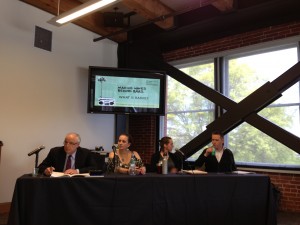Over the weekend I had the most amazing time at the What is Radio? conference in Portland, Oregon. Scholars and radio practitioners from all over the world convened in order to talk about the past, present, and future of radio.
One of the most powerful panel discussions was Friday’s “Making Waves Behind Bars” session. Phil Maguire of the Prison Radio Association shared details about a national prison radio network in the U.K. and local radio producers Lauren Zavrel and Carrie Zumbrum talked about how their program “The Concertina Wire,” brings prisoner voices and stories to radio in Oregon.
Maguire gave us the back story about the Prison Radio Association and said that the goal of the network is to use “the power of radio” to “reduce re-offending.” The national prison radio network runs 24 hours a day, 7 days a week and is by design “by prisoner, for prisoner.” Walking us through the history of prison radio, Maguire played a sound clip of what is purportedly the very first prison radio broadcast. Beginning in 1938, weekly broadcasts of “Thirty Minutes Behind the Walls,” featuring a cast made up entirely of prisoners, aired on a Ft. Worth, Texas radio station. Rumor has it that there was also a radio station (KFOL) at Folsom Prison in California, but I can’t find much information about that, except that a prison radio DJ there, Earl C. Green, was a fan of Johnny Cash and made the request that eventually resulted in Cash visiting and performing at the prison.
The first prison radio station in the U.K., Radio Feltham, was launched in 1994. According to the Prison Radio Association, this station was initially established “to keep prisoners company at night when they were at their most vulnerable.” The Prison Radio Association was set up in 2006 and by 2007 a station was operating out of a prison in Brixton. That station, Electric Radio Brixton, became National Prison Radio in 2010. Today its programs air in prisons all over the U.K. through an audio channel on in-cell television sets.
Maguire explained that prison radio is both”cost-effective” and “life-changing” in that it can be effective in the “rehabilitation process” for prisoners. The network airs a range of programs as well as information about services available to prisoners. There’s a National Prison Radio book club, in which books are read over the air and there are other programs that showcase the stories of crime victims.
In addition to hearing about National Prison Radio, we also learned about a local radio show in Oregon that focuses on prisoner stories. Lauren Zavrel initially approached college radio station KWVA 88.1 FM (Eugene, Oregon) about doing a radio program in which she would read stories from prisoners. In the course of that, she met Carrie Zumbrum, who is now the producer and host of the show “Concertina Wire.” The show is designed to “highlight written work and narrative stories of incarcerated and formerly incarcerated individuals–particularly women and minorities–and to raise awareness about the impact educational programs have in correctional facilities.” Zumbrum explained that for the show she likes to interview a range of people, including children of incarcerated parents. During the panel she played heart-wrenching sections of a multi-part story written by a former prisoner, describing the challenges of raising a family behind bars.
During the question and answer period at the end of the panel Maguire said that he’d love to work to help other countries create their own prison radio stations. Although he said that nobody from the United States has contacted him about such a project, there are some U.S. radio programs that feature prisoners, including the following:
KLSP 97.1 FM at Louisiana State Penitentiary
Apparently the only FCC-licensed radio station located in a prison, the 100 watt radio station has been on the air since 1986. Recently, New Orleans radio station WWOZ headed up a CD donation drive in order to help provide more music to the prison radio station.
This program has been airing on KPFT in Houston since 1980 and features discussion, plus calls from prisoners’ families. Airs on Friday nights from 9 to 11pm
See more Radio Survivor coverage of the What is Radio? conference here:
Anticipating the 2013 What is Radio? Conference in Portland
Radio Storytelling: property of the upper middle class?
WQXR and its Website, an Uneven Partnership?
What is Radio? Conference Podcasts, for those Who Couldn’t Be There



